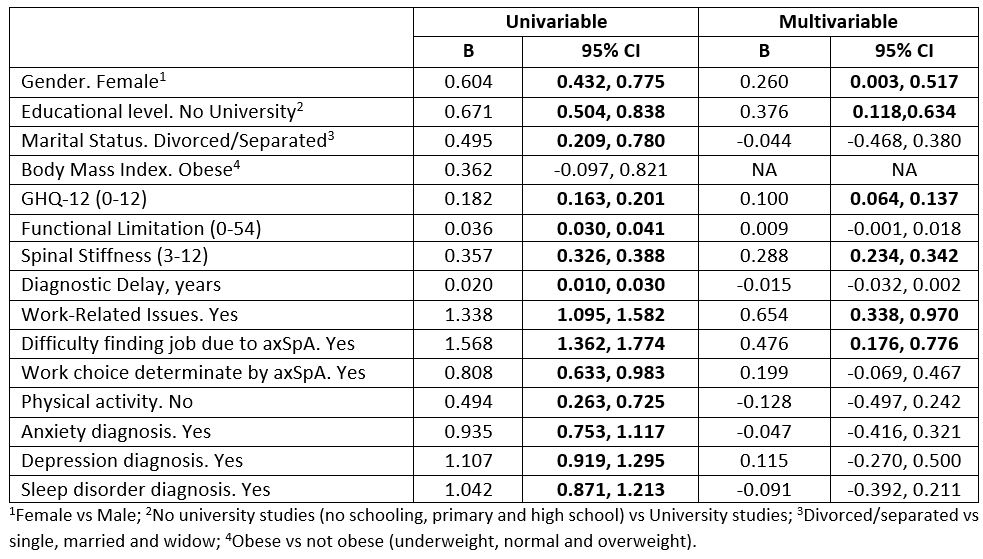Session Information
Session Type: Poster Session A
Session Time: 8:30AM-10:30AM
Background/Purpose: Pain is a hallmark of axial spondyloarthritis (axSpA) and can significantly deteriorate patients’ health status. This analysis aims to investigate factors associated with pain intensity in a large sample of European axSpA patients.
Methods: 2,846 unselected patients participated in EMAS, an online survey (2017-2018) across 13 European countries. Data from 2,636 participants who reported pain were analysed. Pain was measured by the mean of two BASDAI questions (range 0 “no pain” to 10 “most severe pain”): “How would you describe the overall level of AS neck, back or hip pain you have had?” and “How would you describe the overall level of pain/swelling in joints other than neck, back, hips you have had?”. Linear regression analysis was applied to identify associations between pain intensity and sociodemographic factors, patient-reported outcomes [BASDAI (0-10), spinal stiffness (3-12), functional limitation (0-54), mental health using the 12-item General Health Questionnaire GHQ-12 (0-12)], work life, physical activity and comorbidities (N= 850).
Results: The mean age of the sample was 44 years, 61.4% were female, 49.4% had a university degree and 67.7% were married. The average reported pain intensity was 5.3 (±2.2); 76.2% reported pain intensity ≥4, with the greatest intensity reported by women (5.5 vs 4.9, p< 0.001), those not university educated (5.6 vs 5.0, p< 0.001), separated or divorced compared to singles (5.8 vs 5.2, p=0.004), and not physically active (5.7 vs 5.2, p< 0.001). In addition, employed patients who experienced work-related issues reported greater pain (5.2 vs 3.9) as did those who experienced/ believed they would face difficulties finding work due to axSpA (5.9 vs 4.3), and those whose employment choice was determined by axSpA (5.7 vs 4.9; all p< 0.001). Moreover, associations with anxiety (5.9 vs 5.0), depression (6.1 vs 5.0) and sleep disorders (5.9 vs 4.9; all p< 0.001) were also found. The multiple linear regression model showed that those with higher pain intensity reported at least one work-related issue (B= 0.65), difficulties finding work due to axSpA (B= 0.48), not having attended university (B=0.38), greater spinal stiffness (B= 0.29), being female (B= 0.26) and poorer mental health (GHQ-12; B= 0.10; Table 1).
Conclusion: Pain was most strongly associated with working life impairment, as well as with spinal stiffness. Pain was also associated with suffering from depression, anxiety and sleep disorders. Understanding how pain affects individuals and shared-decision making between rheumatologists and patients are essential for long-term disease management and preserving quality of life of axSpA patients.
To cite this abstract in AMA style:
Garrido-Cumbrera M, Navarro-Compán V, Bundy C, Christen L, Mahapatra R, Makri S, Delgado-Domínguez C, Correa-Fernández J, Plazuelo-Ramos P, Poddubnyy D. Factors Associated with Pain Intensity in Axial Spondyloarthritis. Results from the EuropeanMap of Axial Spondyloarthritis (EMAS) [abstract]. Arthritis Rheumatol. 2021; 73 (suppl 9). https://acrabstracts.org/abstract/factors-associated-with-pain-intensity-in-axial-spondyloarthritis-results-from-the-europeanmap-of-axial-spondyloarthritis-emas/. Accessed .« Back to ACR Convergence 2021
ACR Meeting Abstracts - https://acrabstracts.org/abstract/factors-associated-with-pain-intensity-in-axial-spondyloarthritis-results-from-the-europeanmap-of-axial-spondyloarthritis-emas/

